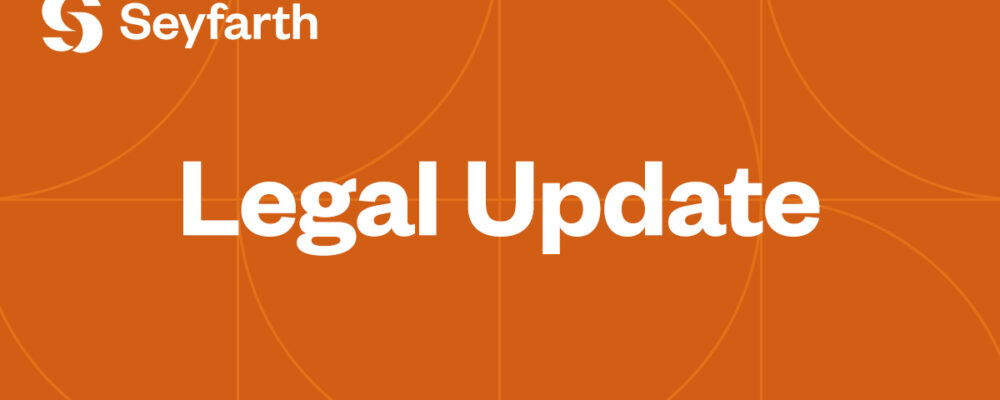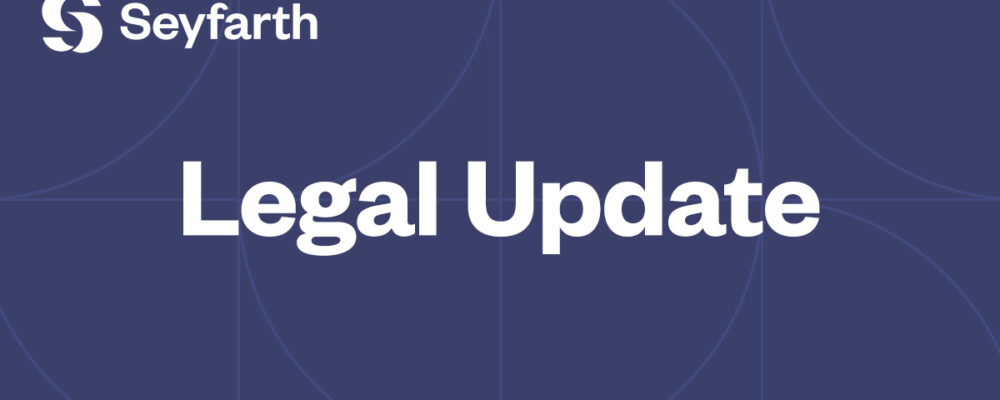On December 23, 2022, President Biden signed the “James M. Inhofe National Defense Authorization Act for Fiscal Year 2023” which, among many other things, amended Section 19 of the Federal Deposit Insurance Act, 12 U.S.C. Section 1829 (FDIA), to reduce hiring barriers across the financial services sector. As a result of this “Fair Hiring in Banking Act,” the category of crimes for which a financial institution can outright reject a job applicant or terminate an employee has been significantly narrowed. More recently, and as expected, the Federal Deposit Insurance Corporation (FDIC) approved a final rule (2024 Final Rule), effective October 1, 2024, to update its Section 19 regulations to conform to the Fair Hiring in Banking Act’s amendments.
Section 19 in a Nutshell
Section 19 prohibits, absent prior written consent of the FDIC, a person convicted of a crime involving dishonesty, breach of trust, or money laundering from (broadly speaking) working for or otherwise participating, directly or indirectly, in the conduct of the affairs of a FDIC-covered financial institution. Section 19’s prohibition also covers anyone who has agreed to enter a pretrial diversion or similar program in connection with the prosecution of a crime involving dishonesty, breach of trust, or money laundering.
To ensure that a financial institution does not violate Section 19, it must engage in a “reasonable” inquiry of a person’s criminal history to determine whether they have a disqualifying offense. The 2024 Final Rule now requires that financial institutions document that inquiry. What that looks like, however, is left to the discretion of the financial institution, although most order a criminal history background check or require the person to submit to a fingerprint check (or both).
The Amendments to Section 19 and the 2024 Final Rule
Here we discuss the 2024 Final Rule as it relates to the recent Amendments to Section 19:
What is a crime of “dishonesty” or “breach of trust”?
The amendment to Section 19 provides guidance to institutions in determining whether an offense is one of “dishonesty” by including a helpful definition of the term. Specifically, a “criminal offense involving dishonesty” means an offense where the person, directly or indirectly, cheats or defrauds, or wrongfully takes property belonging to another in violation of a criminal statute. It also includes an offense that federal, state, or local law defines as “dishonest,” or for which dishonesty is an element of the offense. The term does not, however, include a misdemeanor criminal offense committed more than one year before the date on which a person files a waiver application, excluding any period of incarceration, or an offense involving the possession of controlled substances. According to the 2024 Final Rule, the one-year period runs from the date of the offense, not the date of disposition of the conviction or program entry. If there are multiple offenses, then the one-year period runs from the “last date of any of the underlying offenses.”
Although the amendment to Section 19 does not include a definition of “breach of trust,” the 2024 Final Rule does, stating that the term refers to “a wrongful act, use, misappropriation, or omission with respect to any property or fund that has been committed to a person in a fiduciary or official capacity, or the misuse of one’s official or fiduciary position to engage in a wrong act, use, misappropriation, or omission.”
Which older offenses no longer require an application?
The Section 19 amendment states that unless the conviction or program entry relates to an offense subject to the “minimum 10-year prohibition period” for certain offenses in 12 U.S.C. 1829(a)(2), an applicant or employee no longer needs a waiver application if:
- it has been seven years or more since the offense occurred (measured from the date of offense, not the date of disposition); or
- the person was incarcerated, and it has been five years or more since the person was released from incarceration; or
- the person committed the offense before age 21 and it has been more than 30 months since the sentencing occurred (which means the date the court imposed the sentence).
Did the 2024 Final Rule update the types of offenses that qualify for the de minimis exemption?
On July 24, 2020, the FDIC issued a Final Rule which, among other things, expanded the de minimis exemption in a number of ways (2020 Final Rule):
- It increased the number of minor de minimis offenses on a criminal record to qualify for the de minimis exception from one to two;
- It eliminated the five-year waiting period following a first de minimis offense and established a three-year waiting period following a second de minimis offense (or 18 months if the offense occurred when the person was 21 years of age or younger);
- It increased the threshold for small-dollar, simple theft from $500 to $1,000 (the same dollar threshold for bad or insufficient funds check offenses);
- It expanded the de minimis exemption for crimes involving the use of fake identification to circumvent age-based restrictions from only alcohol-related crimes to any such crimes related to purchases, activities, or premises entry.
Amended Section 19 permitted the FDIC to engage in rulemaking to expand the types of offenses that qualify as de minimis, and the 2024 Final Rule did so by:
- Increasing the requirement that the offense be punishable by a term of one year or less (excluding periods of pre-trial detention and restrictions on location during probation and parole) to three years or less.
- For “bad check criteria,” increasing the aggregate total face value of all insufficient funds checks across all convictions or program entries related to insufficient funds checks from $1,000 or less to $2,000 or less.
- Excluding a new category of lesser offenses, including the use of a fake identification, shoplifting, trespassing, fare evasion, driving with an expired license or tag, if one year or more has passed since the applicable conviction or program entry.
What has not changed?
Section 19 still requires that there be a conviction of record or a pretrial diversion or similar program. It does not cover arrests or pending cases not brought to trial, unless there is a program entry. Section 19 does not cover acquittals or convictions that have been reversed on appeal, but does cover convictions that are currently being appealed or convictions that have been pardoned. In addition, an application is not required for expunged, dismissed, or sealed records or for youthful offender adjudications. Finally, convictions or program entries for a violation of 12 U.S.C. 1829(a)(2) (which relate to certain federal offenses) can never qualify as de minimis.
Next Steps for Financial Institutions
As the penalties for non-compliance are substantial (including fines of $1,000,000 per day), FDIC-insured institutions should review their policies and practices to ensure consideration of Section 19 when assessing candidates’ conviction and program entry history. Convictions and program entries that are no longer automatically disqualifying under Section 19 should be evaluated under other state and local so-called “fair chance” or “ban the box” laws and ordinances, along with the Equal Employment Opportunity Commission’s “Enforcement Guidance on the Consideration of Arrest and Conviction Records in Employment Decisions under Title VII of the Civil Rights Act.”
“With approximately 900 lawyers across 17 offices, Seyfarth Shaw LLP provides advisory, litigation, and transactional legal services to clients worldwide.”
Please visit the firm link to site




